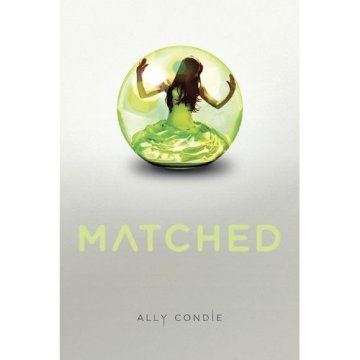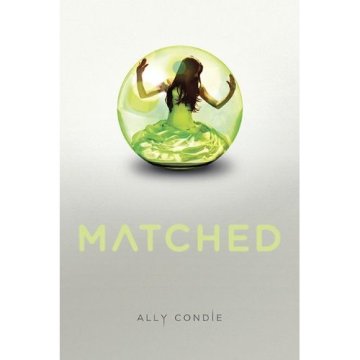 1. I’ve heard people argue that “dystopian fiction” is just a new, girl-friendly label for books that might have been called “science-fiction” in the past. Do you think this is true? Did you read much science-fiction in your youth?
1. I’ve heard people argue that “dystopian fiction” is just a new, girl-friendly label for books that might have been called “science-fiction” in the past. Do you think this is true? Did you read much science-fiction in your youth?
I hadn’t heard that argument! That is an interesting point. I think it may have some merit—but do girls shy away from science fiction as a rule? I really liked sci-fi growing up, particularly Ray Bradbury. (This is probably obvious because there is a scene in Matched that is a tribute to Fahrenheit 451.) His Dandelion Wine is one of my favorite novels of all time.
2. If one were to browse the YA shelves at the local bookstore, one might reach the conclusion that the future of mankind is going to be pretty darn bleak. Are you more optimistic or pessimistic about the days to come?
I’m optimistic. And here is why. I believe in kids. My kids, the kids I used to teach, the kids across the street. I think they are going to change the world in very good ways. I do worry about what we’ve done to the world and don’t think we have a free pass to just hand them our problems—but I believe that the teenagers and kids around today are capable of very, very wonderful things.
3. The love triangle at the center of Matched is both touching and believable. (And few are.) Here’s my question . . . What is it about dangerous boys (rebels, outcasts, “aberrations”) that makes them so incredibly attractive?
This is a great question. I actually don’t think of either of my boys as dangerous. They both play things fairly safe—unless Cassia is involved. I think of Cassia as dangerous, in a very quiet way. She takes risks herself and inspires others to do so too. But, to answer your question (sorry about that tangent!)—I think that boys who have an element of the unknown and the mysterious about them are attractive because of the sense of discovery one has when getting to know them.
4. The scenes with Grandfather made me cry like a baby. And I am NOT the kind of girl who gets teary-eyed over nothing. Were these scenes easy or painful to write?
Both. (And I’m sorry for making you cry.) They were easy to write because the feelings were real. They were painful to write because the feelings were real. I was and am lucky enough to have known my grandparents very well and they, particularly my paternal grandmother, have had a great impact on my life. I love them all very much. And I do not like to say goodbye.
5. Matched is set in a world in which young people’s “mates” are chosen by science. I imagine most people believe that such decisions should be left to the heart. Do you think our hearts are good at “matching” us for life?
If you think about it, we live in this very rare era in which love is seen as the key reason to marry. For most of history, that hasn’t been the case. It’s been about security, family, etc. Love in marriage is kind of a “newer” innovation. Personally, I think our hearts are good at matching us—and so are our minds. If we feel head over heels for someone but something in the back of our mind warns us about something or worries about something, we should give that equal attention. The best marriages always have both involved (mind and heart). I’m very much in love with my husband, but I also know that if we’re going to stay together for life—and beyond—it is going to take work to get there.
6. Matched sends the message that it’s sometimes necessary to break the rules. Have you ever broken the rules? (For the good of mankind, of course.)
Yes, I’ve broken the rules. But not usually in an overt kind of way. I think I feel like I break the rules sometimes not by doing things I “shouldn’t” do, but by feeling ways I “shouldn’t” feel. I think we all feel this way at different times, especially when we are trying to grow and it feels like there are rules holding us back.
7. I thought the language in Matched was incredibly beautiful. You seemed to choose your words with the care and precision of a poet. As it happens, a poem by Dylan Thomas plays an important role in the book. Do you write poetry? Read poetry? And why Dylan Thomas?
What a nice compliment, Kirsten. I don’t actually write much poetry because I am terrible at it. I do read poetry but I am by no means an expert. I tend to read poets I like—Frost, Thomas, Dickinson, Stevens, Norris, etc.—over and over. Probably because it takes me many readings to begin to feel that I am coming to know what the poet might be saying.
I chose the poem by Thomas for many reasons. He himself was a bit of a firebrand, the kind of person the Society in Matched would not have liked. And, of course, the language of the poem is beautiful and the subject fits perfectly with what is happening with Grandfather. But most of all I chose it because it is a poem that people respond to instantly—even people who don’t read poetry. The first line alone can change someone’s life. I know it did mine. The first time I read that poem I felt almost a shock of recognition. “This is how I feel too!” And Thomas is the one who put it into words in such a powerful way.
Thanks for the great interview questions, Kirsten! These were really thought-provoking and fun to answer.--Ally




















